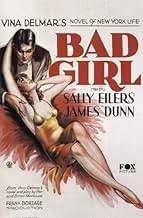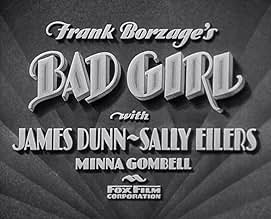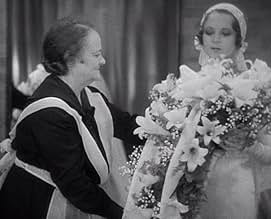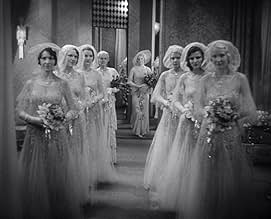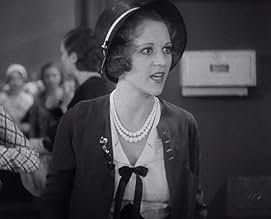PUNTUACIÓN EN IMDb
6,4/10
1,8 mil
TU PUNTUACIÓN
Un hombre y una mujer, escépticos ante el romance, se enamoran y se casan, pero su falta de confianza en el sexo opuesto atormenta su matrimonio.Un hombre y una mujer, escépticos ante el romance, se enamoran y se casan, pero su falta de confianza en el sexo opuesto atormenta su matrimonio.Un hombre y una mujer, escépticos ante el romance, se enamoran y se casan, pero su falta de confianza en el sexo opuesto atormenta su matrimonio.
- Dirección
- Guión
- Reparto principal
- Ganó 2 premios Óscar
- 6 premios y 1 nominación en total
Frank Austin
- Upstairs Tenement Neighbor
- (sin acreditar)
Irving Bacon
- Expectant Father
- (sin acreditar)
William Bailey
- Expectant Father of Twins
- (sin acreditar)
Sue Borzage
- Unknown
- (sin acreditar)
Jesse De Vorska
- Expectant Father
- (sin acreditar)
Bud Eilers
- Man Outside Candy Shop
- (sin acreditar)
Edward Hearn
- Male Nurse
- (sin acreditar)
Aggie Herring
- Seamstress
- (sin acreditar)
Claude King
- Dr. Burgess
- (sin acreditar)
Louis Natheaux
- Mr. Thompson
- (sin acreditar)
Sarah Padden
- Mrs. Gardner
- (sin acreditar)
Lorin Raker
- Male Nurse
- (sin acreditar)
Reseñas destacadas
"Bad Girl" was a fun movie for a good 3/4ths of the film, then it became frustrating. This movie was an early version of miscommunication in a rom-com. Miscommunication seems to be a staple and an essential plot device in most rom-coms and it is ALWAYS irritating.
Dorothy Haley (Sally Eilers) was a pretty young lady who was tired of every guy making a pass at her. She found a rare bird when she met Eddie Collins (James Dunn) at a fair. Eddie not only didn't try to make a pass at her, he was a bit rude.
Dorothy liked it.
Apparently, she was interested in guys who weren't ostensibly interested in her. The more standoffish he was the more she was drawn in. She was smitten, and even though he didn't show it, Eddie was too.
The two got married in fast order and that's when all the miscommunication started. It was even worse once she got pregnant and was too scared to tell him. From there the communication between them just got to the point that each of them continued to make assumptions about the other. It was enough to drive you mad. "Just tell her what you've done!" I wanted to scream. "Just tell him you're pregnant!" is what I wanted to yell. Truthfully, most of the miscommunication was the fault of Eddie. He would never say what he was doing.
Eddie was concerned about money and being able to afford the finer things in life. He'd said over and over that kids would only upset his plans. When Dorothy said that there was more to life than just money, he responded, "Sure, there are a lot of things in life besides money, but you gotta have money to find them." But, as obsessed as he professed to be about money and opening his own business, he was really crazy about his wife and their prospective baby.
Between the two of them was Dorothy's friend, Edna Driggs (Minna Gombell). She was a go between at times who helped them out. She had a contentious relationship with Eddie, but it was very lighthearted. The two of them reminded me of Martin and Pam in the sitcom "Martin." They'd throw insults back and forth all day, but they never took it personally and never attacked each other to hurt deep, just to get the best quip in.
Edna consistently calmed Dorothy down when she got excited or upset about Eddie and his apparent flippancy. Eddie was working hard for his wife and unborn child, and while Dorothy should've assumed the best, Eddie should've been more forthright. To see the two have these absurd conversations because of holding back very simple information made the movie a little less enjoyable. The movie was great when they were dating, it became a bit of a chore once they were married.
Free on YouTube.
Dorothy Haley (Sally Eilers) was a pretty young lady who was tired of every guy making a pass at her. She found a rare bird when she met Eddie Collins (James Dunn) at a fair. Eddie not only didn't try to make a pass at her, he was a bit rude.
Dorothy liked it.
Apparently, she was interested in guys who weren't ostensibly interested in her. The more standoffish he was the more she was drawn in. She was smitten, and even though he didn't show it, Eddie was too.
The two got married in fast order and that's when all the miscommunication started. It was even worse once she got pregnant and was too scared to tell him. From there the communication between them just got to the point that each of them continued to make assumptions about the other. It was enough to drive you mad. "Just tell her what you've done!" I wanted to scream. "Just tell him you're pregnant!" is what I wanted to yell. Truthfully, most of the miscommunication was the fault of Eddie. He would never say what he was doing.
Eddie was concerned about money and being able to afford the finer things in life. He'd said over and over that kids would only upset his plans. When Dorothy said that there was more to life than just money, he responded, "Sure, there are a lot of things in life besides money, but you gotta have money to find them." But, as obsessed as he professed to be about money and opening his own business, he was really crazy about his wife and their prospective baby.
Between the two of them was Dorothy's friend, Edna Driggs (Minna Gombell). She was a go between at times who helped them out. She had a contentious relationship with Eddie, but it was very lighthearted. The two of them reminded me of Martin and Pam in the sitcom "Martin." They'd throw insults back and forth all day, but they never took it personally and never attacked each other to hurt deep, just to get the best quip in.
Edna consistently calmed Dorothy down when she got excited or upset about Eddie and his apparent flippancy. Eddie was working hard for his wife and unborn child, and while Dorothy should've assumed the best, Eddie should've been more forthright. To see the two have these absurd conversations because of holding back very simple information made the movie a little less enjoyable. The movie was great when they were dating, it became a bit of a chore once they were married.
Free on YouTube.
A wildly uneven film that seems as confused as its marketing. The pre-Code era was known for salacious titles and advertisement, but I don't think I've ever seen a film more at odds with its poster. I'm not kidding, these are the words underneath the poster of the main character (Sally Eilers) leaning back with her ukulele:
EVERYBODY KNOWS THIS GIRL There's one in every town Tumult in her heart. She wanted things. Clothes. Boy friends. Fun. Gayety. Kisses. * Red-lipped shop girl in sleazy dress, Aching with suppressed emotions ... dance halls ... excursion steamers ... chop suey palaces ... Coney Island ... clinging farewells ... then back to the hall bedroom. * Drama of girls ... who love to live. Laughter of girls ... who live to love. * It's romance of the working girl ... today ... your most dependable patron.
In the actual film, nothing could be further from the truth. Eilers' character is not loose, flirtatious, or even pushing on the boundaries of the role women were assigned to. We see a lot of bad male behavior though, e.g. men coming on to her (leading her to remark to her friends that all of them have just one thing on their minds), a controlling brother who hits her for coming home late (alluded to, not shown), and even the guy she's attracted to (James Dunn) doling out insults and mansplaining things. When the two marry on a whim because she fears facing her brother after coming home at 4 am (though not having had sex), he also tells her that no wife of his will be getting a job.
The best part of the film is the support she gets from her friend (Minna Gombell), a tough talking woman who stands up for her. She literally flicks her husband's chin upwards while fixing his tie, and the two part with this exchange: "Bye, Grouch" / "So long, Dizzy."
The film providing a window into the conditions women faced and the bond between friends is when it's at its best, but it's less successful afterwards. At its center this is a relationship picture, with the married couple dealing with tight finances, and miscommunicating when she gets pregnant (they both think the other doesn't want a baby). It got quite tiresome over the last half hour for me. Dunn has a weepy scene where his acting leaves a lot to be desired, then improbably offers himself up in a boxing match for money. The nurse at the hospital oddly teases Eilers' character by bringing out several different babies before giving her hers, and all of these scenes seem like filler for a film that lost its way.
As for the Oscar that director Frank Borzage won for this film, it's frankly hard to understand. It's an average film for the period, with nothing that stood out. The images of light and shadow that Josef von Sternberg captured with Marlene Dietrich in 'Shanghai Express,' on the other hand, are immortal. That year also saw so many other great efforts, e.g. Ernst Lubitsch (The Smiling Lieutenant), Rouben Mamoulian (Dr. Jekyll and Mr. Hyde), Clarence Brown (A Free Soul), Fritz Lang (M), William A. Wellman (The Public Enemy), F.W. Murnau (Tabu), King Vidor (Street Scene), Frank Capra (The Miracle Woman), and Roy del Ruth (Blonde Crazy). I usually don't like to fixate on awards and apologize for this long and pedantic laundry list, but my point is that if you're looking for a stellar film from 1931, you can do so much better than this one.
EVERYBODY KNOWS THIS GIRL There's one in every town Tumult in her heart. She wanted things. Clothes. Boy friends. Fun. Gayety. Kisses. * Red-lipped shop girl in sleazy dress, Aching with suppressed emotions ... dance halls ... excursion steamers ... chop suey palaces ... Coney Island ... clinging farewells ... then back to the hall bedroom. * Drama of girls ... who love to live. Laughter of girls ... who live to love. * It's romance of the working girl ... today ... your most dependable patron.
In the actual film, nothing could be further from the truth. Eilers' character is not loose, flirtatious, or even pushing on the boundaries of the role women were assigned to. We see a lot of bad male behavior though, e.g. men coming on to her (leading her to remark to her friends that all of them have just one thing on their minds), a controlling brother who hits her for coming home late (alluded to, not shown), and even the guy she's attracted to (James Dunn) doling out insults and mansplaining things. When the two marry on a whim because she fears facing her brother after coming home at 4 am (though not having had sex), he also tells her that no wife of his will be getting a job.
The best part of the film is the support she gets from her friend (Minna Gombell), a tough talking woman who stands up for her. She literally flicks her husband's chin upwards while fixing his tie, and the two part with this exchange: "Bye, Grouch" / "So long, Dizzy."
The film providing a window into the conditions women faced and the bond between friends is when it's at its best, but it's less successful afterwards. At its center this is a relationship picture, with the married couple dealing with tight finances, and miscommunicating when she gets pregnant (they both think the other doesn't want a baby). It got quite tiresome over the last half hour for me. Dunn has a weepy scene where his acting leaves a lot to be desired, then improbably offers himself up in a boxing match for money. The nurse at the hospital oddly teases Eilers' character by bringing out several different babies before giving her hers, and all of these scenes seem like filler for a film that lost its way.
As for the Oscar that director Frank Borzage won for this film, it's frankly hard to understand. It's an average film for the period, with nothing that stood out. The images of light and shadow that Josef von Sternberg captured with Marlene Dietrich in 'Shanghai Express,' on the other hand, are immortal. That year also saw so many other great efforts, e.g. Ernst Lubitsch (The Smiling Lieutenant), Rouben Mamoulian (Dr. Jekyll and Mr. Hyde), Clarence Brown (A Free Soul), Fritz Lang (M), William A. Wellman (The Public Enemy), F.W. Murnau (Tabu), King Vidor (Street Scene), Frank Capra (The Miracle Woman), and Roy del Ruth (Blonde Crazy). I usually don't like to fixate on awards and apologize for this long and pedantic laundry list, but my point is that if you're looking for a stellar film from 1931, you can do so much better than this one.
An interesting little Borzage love story set during the Depression, detailing the struggles of young couple (Sally Eilers & James Dunn) with their hopes and dreams. Curiously Borzage won his second Oscar as Best Director for this oddly heady little movie and that's perhaps the only reason to watch it. It works as a timepiece of its era. But I definitely wouldn't call "Bad Girl" one of Borzage's best romances (in many ways it strikes me as turgid and unaffecting in several moments, and I didn't like the ending), but it is definitely worth catching if you are fan or a student of the director's sublime and unheralded oeuvre.
Bad Girl is included in the new Murnau/Borzage and Fox collection,and kudos to them for making it available! Though an excellent little slice of life film from the Depression Era, I definitely wouldn't say that it compares with Borzage's timeless silent romances, though Borzage's recurrent theme of love conquering all is here to.The lead actors,Sally Eilers, and James Dunn, both do fine jobs, especially Dunn, who paints a very realistic portrait of a "regular Joe", decent kind of a guy. His performance rings true, and he later made a comeback, winning the Oscar for Best Supporting Actor in A Tree Grows in Brooklyn.(1945) This is the story of a young couple's struggle to make it through marriage, finances, and becoming parents. The background story of what was considered "making it" in a poor economy is especially pertinent today. Dunn's character, Eddie Collins, thought it was opening his own radio shop, providing his wife with an elaborately furnished apartment, and getting her the best doctor for her delivery. Not so different from what young couples are facing today! The film is sometimes a bit too wordy, but the slang of the time is a hoot! As one of Borzage's smaller films, it's worth a watch.
Bad Girl is another of Frank Borzage's romantic dramas of the trials and tribulations of lovers usually caught in circumstances and forces beyond their
control. In this case it's the Great Depression and their own attitudes about
romance itself.
Their attitudes being that romance is just a lot of bunk. But attitude or not James Dunn who was making his feature film debut and Sally Eilers are in love in spite of themselves.
I'm not quite sure why the film is entitled Bad Girl since there really isn't nothing bad about Eilers at all. Possibly her original attitude though that is quickly corrected. These are just two people trying to get by, but they always seem to misjudge attitudes because of first impressions and say the wrong things at time.
Take for instance the new apartment that Dunn uses all his savings in to impress Eilers. He says exactly the wrong thing about the two of them living only for today. That's just at the time she was about to break the news that wasn't to be two any more, but three.
Dunn really loves her. How many husbands to earn an extra couple of dollars would go out and try to go 4 rounds with a professional prizefighter? Charles Sullivan proves to be a good guy however.
So does Claude King as the obstetrics specialist who does Dunn a solid when Dunn wants him for his wife's delivery. None but the best as Dunn beautifully carries off a scene breaking down begging for King's services.
The film adapted from a Broadway play of the previous year won an Oscar for adapted screenplay. It also won for Frank Borzage an Oscar for Best Director.
Today's audiences might get a kick out of the prices and the amounts needed for many things. Inflation has come a long way since. Still the themes are universal and I think Bad Girl holds up well today.
Their attitudes being that romance is just a lot of bunk. But attitude or not James Dunn who was making his feature film debut and Sally Eilers are in love in spite of themselves.
I'm not quite sure why the film is entitled Bad Girl since there really isn't nothing bad about Eilers at all. Possibly her original attitude though that is quickly corrected. These are just two people trying to get by, but they always seem to misjudge attitudes because of first impressions and say the wrong things at time.
Take for instance the new apartment that Dunn uses all his savings in to impress Eilers. He says exactly the wrong thing about the two of them living only for today. That's just at the time she was about to break the news that wasn't to be two any more, but three.
Dunn really loves her. How many husbands to earn an extra couple of dollars would go out and try to go 4 rounds with a professional prizefighter? Charles Sullivan proves to be a good guy however.
So does Claude King as the obstetrics specialist who does Dunn a solid when Dunn wants him for his wife's delivery. None but the best as Dunn beautifully carries off a scene breaking down begging for King's services.
The film adapted from a Broadway play of the previous year won an Oscar for adapted screenplay. It also won for Frank Borzage an Oscar for Best Director.
Today's audiences might get a kick out of the prices and the amounts needed for many things. Inflation has come a long way since. Still the themes are universal and I think Bad Girl holds up well today.
¿Sabías que...?
- CuriosidadesWilliam Pawley played the role of Dorothy's brother in the stage version, and reprises his role here in the film.
- PifiasAt 2:54, shadow of boom mic is visible across Dot's face.
- Citas
Dorothy Haley: I gotta go upstairs now. You see, my mother's dead, and my brother's boss of the house. He gets sore when I stay out late. You know, he's careful for me. But as Edna says, you can't watch a girl hard enough to keep her good if she don't want to be.
- ConexionesAlternate-language version of Marido y mujer (1932)
Selecciones populares
Inicia sesión para calificar y añadir a tu lista para recibir recomendaciones personalizadas
- How long is Bad Girl?Con tecnología de Alexa
Detalles
- Duración1 hora 30 minutos
- Color
Contribuir a esta página
Sugerir un cambio o añadir el contenido que falta

Principal laguna de datos
By what name was Bad Girl (1931) officially released in India in English?
Responde
